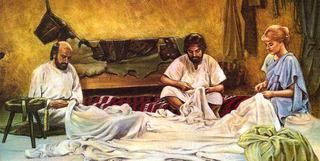Acts 18:1-4 ESV[1] After this Paul left Athens and went to Corinth. [2] And he found a Jew named Aquila, a native of Pontus, recently come from Italy with his wife Priscilla, because Claudius had commanded all the Jews to leave Rome. And he went to see them, [3] and because he was of the same trade he stayed with them and worked, for they were tentmakers by trade. [4] And he reasoned in the synagogue every Sabbath, and tried to persuade Jews and Greeks.
Introduction:
In the tapestry of the early Christian church, certain figures stand out not only for their faith but for their dynamic partnership and commitment to service. Acts 18:1-4 introduces us to Aquila and Priscilla, a couple whose partnership, companionship, and bivocational lifestyle left an indelible mark on the early church. Let’s explore their story and draw valuable lessons for our lives today.
Background:
Aquila and Priscilla were Jewish Christians who, like many, were forced to leave Rome due to Emperor Claudius’s decree expelling Jews from the city (Acts 18:2). They settled in Corinth, a bustling trade center. There they met the apostle Paul, who also worked as a tentmaker, a profession shared by Aquila. This commonality forged a strong bond between them.
Partnership and Companionship:
Their story reminds us of the importance of companionship in our faith journey. Having a partner who shares our beliefs can provide encouragement, accountability, and support, especially during times of adversity. But, married or not, we can serve Christ. After all, Paul was either single, widowed, or divorced, we do not know for certain. When discussing this matter in his letter to the Corinthians, He said this;
1 Corinthians 7:7-9 ESV[7] I wish that all were as I myself am. But each has his own gift from God, one of one kind and one of another. [8] To the unmarried and the widows I say that it is good for them to remain single, as I am. [9] But if they cannot exercise self-control, they should marry. For it is better to marry than to burn with passion.
- What role did partnership play in Aquila and Priscilla’s ministry?
- Partnership was foundational to their ministry. They not only supported each other but also worked alongside Paul in spreading the Gospel.
- Scripture: Acts 18:3 – “And because he was of the same trade, he stayed with them and worked, for they were tentmakers by trade.”
- How did their companionship impact their effectiveness in ministry?
- Their companionship provided mutual encouragement and strength, enabling them to endure challenges and remain steadfast in their faith.
- Scripture: Romans 16:3-4 – “Greet Prisca and Aquila, my fellow workers in Christ Jesus, who risked their necks for my life, to whom not only I give thanks but all the churches of the Gentiles give thanks as well.” This couple left an indelible mark on the first-century church as servants and discipleship. They were a ministry power couple.
- The power of married couples in agreement in service cannot be overstated. “Two are better than one, because they have a good return for their labor: If either of them falls down, one can help the other up. But pity anyone who falls and has no one to help them up.” – Ecclesiastes 4:9-10 (ESV)
Bivocational Lifestyle:
- What is bivocation, and how did Aquila, Priscilla, and Paul exemplify it?
- Bivocation refers to the practice of engaging in both secular work and ministry. Aquila and Priscilla balanced their trade as tentmakers with their service to the church. As servants of Christ we are all bivocational. That is, if we are serving the Lord in the body of Christ, His Church.
- Scripture: Acts 18:3 – “And because he was of the same trade, he stayed with them and worked…” Let’s look at Paul’s example
- Paul’s Example of a Bivocational Lifestyle
- Acts 20:33-35 (ESV)
- “I coveted no one’s silver or gold or apparel. You yourselves know that these hands ministered to my necessities and to those who were with me. In all things I have shown you that by working hard in this way we must help the weak and remember the words of the Lord Jesus, how he himself said, ‘It is more blessed to give than to receive.'”
- Taking No Money from the Churches:
- 1 Corinthians 9:15-18 (ESV)
- “But I have made no use of any of these rights, nor am I writing these things to secure any such provision. For I would rather die than have anyone deprive me of my ground for boasting. For if I preach the gospel, that gives me no ground for boasting. For necessity is laid upon me. Woe to me if I do not preach the gospel! For if I do this of my own will, I have a reward, but if not of my own will, I am still entrusted with a stewardship.”
- 2 Corinthians 11:7-9 (ESV)
- “Or did I commit a sin in humbling myself so that you might be exalted, because I preached God’s gospel to you free of charge? I robbed other churches by accepting support from them in order to serve you. And when I was with you and was in need, I did not burden anyone, for the brothers who came from Macedonia supplied my need. So I refrained and will refrain from burdening you in any way.”
- 2 Thessalonians 3:7-9 (ESV)
- “For you yourselves know how you ought to imitate us, because we were not idle when we were with you, nor did we eat anyone’s bread without paying for it, but with toil and labor we worked night and day, that we might not be a burden to any of you. It was not because we do not have that right, but to give you in ourselves an example to imitate.”
- What lessons can we learn from their bivocational lifestyle?
- Their example teaches us the importance of integrating our faith into every aspect of our lives, including our careers. I wonder how many would exit the ministry if they did not receive a paycheck? Please do not misunderstand my point. Indeed, “the laborer is worthy of his wages” is a biblical principle found in Luke 10:7 (ESV), where Jesus instructs his disciples on how they should conduct themselves as they go out to spread the Gospel: “And remain in the same house, eating and drinking what they provide, for the laborer deserves his wages. Do not go from house to house.” This principle emphasizes the importance of recognizing and honoring the work and contributions of individuals. It speaks to the idea of fairness and just compensation for one’s efforts. In the context of the passage, it also highlights the hospitality and support that should be extended to those who are dedicated to spreading the message of faith. It reminds us to treat others with respect and to ensure that they are fairly compensated for their contributions, whether it be in the form of financial reward, recognition, or support. I just want to remind us that service to Christ is a call that supercedes a vocation. As an old preacher once told me “it’s hard work, but it ain’t a job son.”
- Scripture: Colossians 3:23-24 – “Whatever you do, work heartily, as for the Lord and not for men, knowing that from the Lord you will receive the inheritance as your reward. You are serving the Lord Christ.”
Impact as Servants of the Church:
- How did Aquila and Priscilla serve the church beyond their partnership and bivocational lifestyle?
- They played a pivotal role in nurturing and mentoring other believers, including Apollos, who later became a significant figure in the early church (Acts 18:24-26).
- Scripture: Acts 18:26 – “He began to speak boldly in the synagogue, but when Priscilla and Aquila heard him, they took him aside and explained to him the way of God more accurately.”
Life Applications:
- Embrace partnership and companionship: Strive for unity in your marriages as ministry partners and surround yourself with fellow believers who can support and encourage you in your faith journey.
- Integrate faith into every aspect of life: Whether in your career, relationships, or daily activities, let your faith shine through as a testimony to others.
- Mentor and disciple: Just as Aquila and Priscilla invested in the spiritual growth of Apollos, look for opportunities to mentor and disciple others, sharing the truth and love of Christ.
The story of Aquila and Priscilla serves as a timeless example of partnership, companionship, and bivocational living in service to the church. May we draw inspiration from their lives as we seek to live out our faith in a world that desperately needs the light of Christ. B

